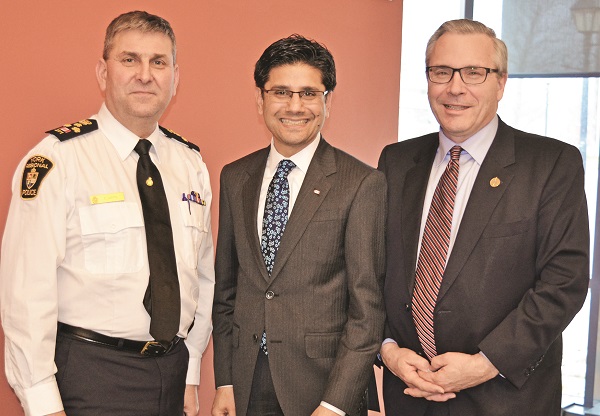General News » News
Minister, YRP, and community groups gather for talks on “modern” policing
April 20, 2016 · 0 Comments

By Brock Weir
People have their own perceptions of what a police officer does and looks like within a community.
But, are these perceptions true? Is there room to “modernize” what it means to be a police officer in 2016?
These are the questions community groups from across York Region hoped to answer in a roundtable discussion in Aurora last week with Yasir Naqvi, Minister of Community Safety and Correctional Services, and members of the York Regional Police.
Hosted at the Aurora Public Library by Newmarket-Aurora MPP Chris Ballard, it brought together representatives from faith and cultural groups, seniors organizations, 360 Kids, Yellow Brick House, and a host of other organizations, as part of the Province’s public engagement sessions that will lead to the Strategy for a Safer Ontario.
“We have been having these types of conversations across the Province on developing a strategy for Ontario,” said Mr. Naqvi. “A big thrust of that is to modernize policing in Ontario and rewriting the Police Services Act, which has not changed substantially in the last 25 years. What we have been hearing from the community is how can we be more proactive and community-focused [with] policing? How can we create a policing framework that is collaborative with other community partners around healthcare, especially around mental health, education and other community groups, and be more upstream in terms of providing the kind of interventions so you don’t have to just react when situations occur.
“It is a better model of policing. It is more community-focused and it saves costs financially for local municipalities as well.”
These community consultations look at several areas which Mr. Naqvi calls “key pillars.” These include looking at ways to foster “a more robust local community safety” approach, involving community safety hubs to enhance coordination and intervention “on challenges that may jeopardize the community” as well as defining a “21st Century Police Officer.”
“How do we modernize policing in the sense of training and education requirements, the use of technology and use of other community safety personnel such as bylaw officers or special constables?” said the Minister. “We’re looking at that entire spectrum. Another important piece is around civilian governance and oversight and strengthening that so there are more, stronger community voices when it comes to ensuring the police services that are provided in a community like York Region is rooted in those community values and overseen by the local community.”
So, what does it mean to be a 21st century police officer?
Chief Eric Jolliffe recognized the “industry” is changing, the times are changing, and the work of frontline officers is becoming more and more challenging. Last week’s roundtable, he said, was an opportunity to make sure “we thoroughly investigate the opportunities to partner for community safety together.”
From the perspective of Deputy Chief Tom Carrique, there was nothing new proposed out of the roundtable they haven’t been discussing already, but the dialogue was valuable.
“One suggestion we did make note of was providing more training for the social service aspects that we get drawn into, but that is what this discussion is about: what are the core responsibilities of policing and how do we support police services in delivering those services?” he said.
Added Chief Jolliffe: “From a positive perspective, it is nice to reaffirm our folks are doing a great job every day and we heard that around the table. There are opportunities to expand the conversation around training and how that might unfold. There is some blue-sky thinking, but having someone come to our profession with all the tools of the trade before we hire them.”
Recently, Premier Kathleen Wynne pointed to “systemic racism” still existing in our society when confronted by Black Lives Matter protestors at Queen’s Park.
Addressing race relations in policing, the Minister said training is a “very important” component on that.
“The most recent work we did in terms of carding, we have come up with requirements to have more robust training for police officers in anti-bias, in race relations and discrimination. We have actually created an expert advisory panel to help us guide through that,” he said. “We heard today about diversity in recruitment as a big element in making sure police services are reflecting the communities they police. We had a lengthy conversation on what skillsets you’re looking at and the training and educational requirements and how can we attract more people from diverse backgrounds that actually are reflective of the community to ensure that policing is rooted in community values.”
Added Mr. Ballard: “The training has to be more than technical, it has to be more than academic; it has to be reflective of the community at large.”











